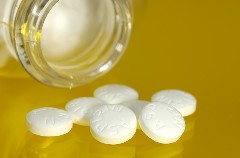Aspirin
Aspirin is a product that most of us take for granted. We don't even think about where it came from...we just reach for it whenever we have a headache, fever or need an 'over the counter' anti inflammatory drug. Yes, it is a drug and as with all drugs it has certain risks...and benefits associated with it.
Back around 400BC that famous Greek physician Hippocrates was recorded as having prescribed the bark and leaves of a particular willow tree to relieve pain and fever in his patients.
As it turns out, that bark and those leaves were rich in a substance called Salicin.
Fast forward to 1832 where experiments performed by a German chemist yielded isolation of a phytohormone from the salicin in Willow bark called Salicylic Acid.
Salicylic Acid was first synthesized in 1893 and produced the active ingredient in aspirin we now know as acetylsalicylic acid or ASA.
Acetylsalicylic Acid is a member of the family of Nonsteroidal Anti Inflammatory drugs known as NSAIDs. Another well known NSAID is Ibuprofen.
NSAIDs
are used widely to treat pain, fever and inflammatory conditions.
Aspirin has also become well known in relatively recent times as an Anti
Platelet drug. Other NSAIDs have this anti platelet property also...but
they tend not to last as long...in terms of their anti clotting effect.
How does it work?
Blood clotting
Thromboxane A-2 is a chemical in your blood that platelets produce. This chemical is what causes platelets to clump together...when required to do so
Aspirin interferes with the clotting process by inhibiting the action of an enzyme called cyclo-oxygenase-1 or COX-1. This enzyme is responsible for the production of the chemical Thromboxane A-2
Inflammation
Prostaglandins are hormone like substances that are involved in many body functions. One is the inflammatory response.
Aspirin is able to affect the inflammatory mechanism because it suppresses activity of a category of Prostaglandin in the body called PGE2. PGE2 is involved in the pro-inflammatory response.
In what medical settings is this drug used?
- During a heart attack and episodes of Unstable Angina
- May help prevent future heart attacks
- May improve survival post MI or in those with heart disease risk factors
- Pre and post Percutaneous Coronary Intervention - PCI - including Drug Eluting Stent implantation
- In those with history of stroke or TIA - Transient Ischemic Attack or mini stroke
Your health care professional may also advise you to take aspirin if you...
- Have a significant family history of heart disease
- Have elevated cholesterol
- Are a middle aged male or a post menopausal female
- Have high blood pressure
- Smoke tobacco
- Have Diabetes
Possible side effects may include:
- Bleeding
- Gastrointestinal Irritation - heartburn, inflammatory bowel disease
- Gastrointestinal hemorrhage - ulcers
- Hemorrhagic stroke - bleeding in the brain
- Asthma
- Hives - urticaria
- Possible negative interaction with ACE inhibitor drugs
- Ringing in the ears - tinnitus
- Hearing loss
- Chronic rhinitis and nasal polyps
- Vertigo
- Inhibition of cartilage repair and accelerated cartilage destruction
Natural Alternatives:
- Gamma Linolenic Acid or GLA - This substance is found in black currant seed and evening primrose - EPO. GLA has been shown to increase the activity of PGE1 prostaglandins. This produces an anti-inflammatory effect.
- Garlic - May prevent thrombus formation and lower blood pressure.
- Magnesium - has synergistic anticoagulant properties in combination with vitamin E. Remember to balance magnesium with both calcium and potassium if you intend to supplement
- Vitamin E - retards blood clotting
- Omega 3 - EPA oils reduce platelet stickiness.
- Flavonoids and Terpenoids - Phytochemicals that may inhibit blood clot formation
- Auricularia Polytricha - Chinese mushroom or ear fungus...because of its shape.This mushroom inhibited the platelet response in the researcher who accidentally discovered its antiplatelet effect and some volunteers. The effect lasted for 3-24 days in the test subjects.
- White Willow Bark Extract - Interestingly Native American Indians drank white willow bark tea for the purpose of relieving aches and pains. White willow extract contains salicin. Present in its natural form it won't be as fast acting as its sythetic drug 'equivalent'...in fact it may take several days. Once it is present in your blood stream in a sufficient concentration to have an effect on your physiology, White Willow will also effect your platelet stickiness, act as an anti inflammatory and an antipyretic - fever reducer.
Click here to go from Aspirin to Coronary Heart Health Home Page
|
Weight Control Hot Links Click on a Link for More Info! |




